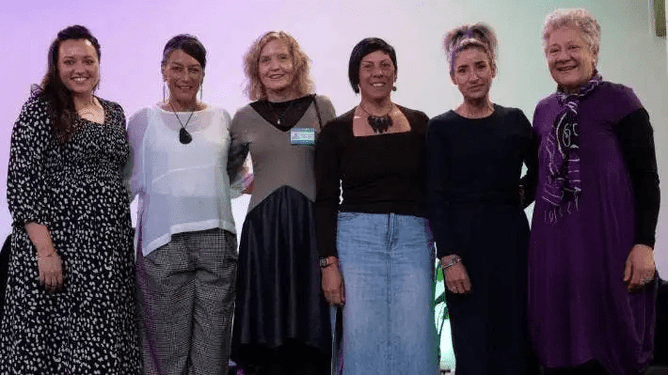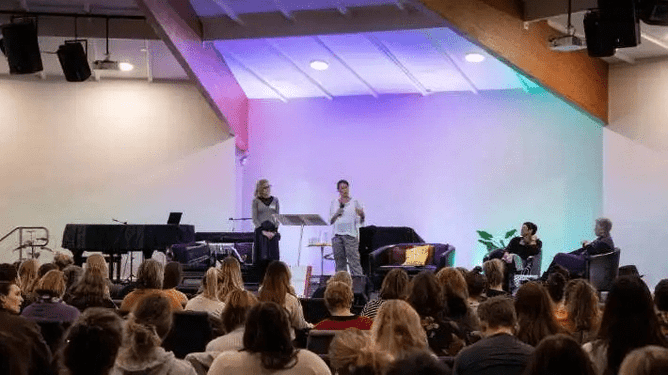(Story from Timaru Herald – Writer Keiller MacDuff, Photos Valentina Bellomo)
Presenters and organisers of the Trauma-informed Care National Training Day. From left Mekenna Cipres, Mirror Services; Anah Aikman, South Canterbury DHB; Dr Bronwyn Dunnachie, Werry Workforce Whāraurau; Dr Moana Eruera, Oranga Tamariki; Michelle Baughan, Mirror Services and Associate Professor Nicola Atwool of Otago University.
Close to 200 people packed the auditorium at the inaugural Trauma-informed Care National Training Day in Timaru on Tuesday.
Anah Aikman, (Ngāti Maniapoto, Ngāti Wairere) learning advisor for the South Canterbury District Health Board’s Mental Health and Addiction learning hub, said the response to the event had been amazing, reaching capacity within just days of advertising.
Another of the organisers, Dr Bronwyn Dunnachie of Werry Workforce Whāraurau, said they could probably have filled the room again given the demand for the free event, which was open to people working with tamariki and whānau from across the country.
Dunnachie said the event was deliberately cross-sectorial and cross-services, and was attended by educators, medical personnel, social workers, corrections officers and many more.
Aikman said trauma informed care is “about looking at people and what’s happened to them and how that influences what’s going on for them now”.
“It’s about basic values like manaaki (respect).”
Aikman said a trauma-informed approach is not just for doctors and teachers, but for the entire community.
“We have to change the way we deal with people, the way we help people through trauma.”
“It’s up to us as practitioners, employers and everyday people to be non-judgemental, and to give people opportunities to share.”
Asked if the over-stretched health, education and social services sectors can afford to take a holistic approach, Aikman said the alternative was far more expensive.
“If we don’t address this it’s only going to magnify, and the costs are going to become even more disproportionate.”
Aikman and Dunnachie both acknowledged there is a lot of work to do in the area of trauma awareness and the provision of trauma informed care, but were quick to point out how much better the understanding of mechanisms and impact of trauma had become in recent years.
A large crowd packed the auditorium at the Life Church to take part in the first Trauma-informed Care National Training Day. From left, Dr Bronwyn Dunnachie, Werry Workforce Whāraurau; Anah Aikman, South Canterbury DHB; Dr Moana Eruera, Oranga Tamariki and Assoc. Prof Nicola Atwool, Otago University.
Aikman said part of the recent spike of interest around trauma informed care may have been prompted by the experience of the pandemic, which “mobilised people to think in different ways around what we really need to be well”.
Other presenters included University of Otago associate professor Nicola Atwool who spoke about how to work with children and whānau with histories of trauma and the importance of trauma-informed workplaces for people in these roles and Dr Moana Eruera on Māori experiences of trauma and wellbeing.

